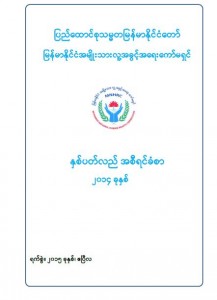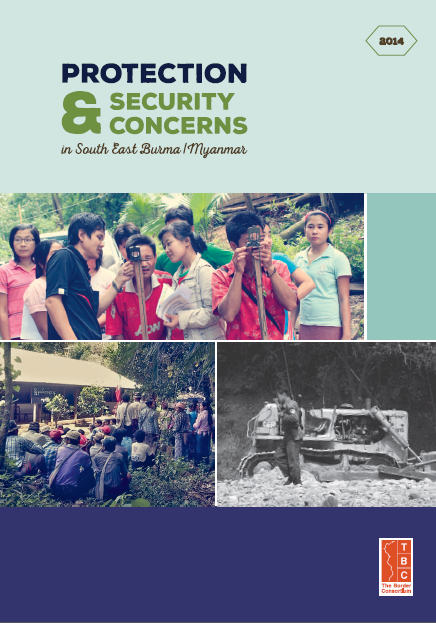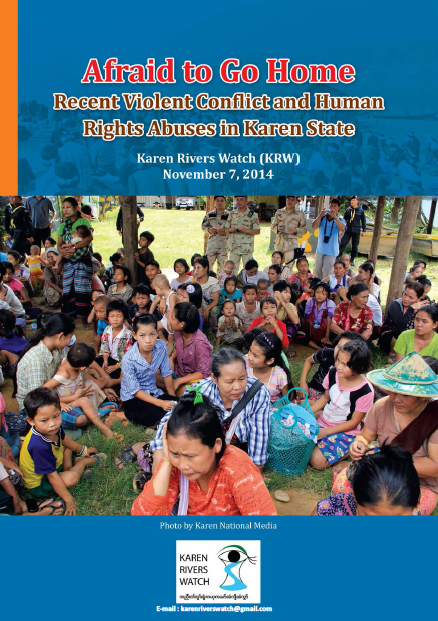Business and Human Rights (142 found)
Kachin State Natural Resources Development Discussion Paper
 This policy discussion paper is based on our experiences and findings of our community research over the last ten years, documenting the impacts of centralized mega development projects on peoples across Kachin state. We did this research together with local communities, including in Hukawng, Hpakant, Putao, Chibwe, Tangphre as well as others. This paper also draws on experiences and solutions from other countries where there has been conflict over natural resources. We hope this paper will contribute to the debate over political solutions to allow the future generations of Kachin state to benefit from its natural resources […]
This policy discussion paper is based on our experiences and findings of our community research over the last ten years, documenting the impacts of centralized mega development projects on peoples across Kachin state. We did this research together with local communities, including in Hukawng, Hpakant, Putao, Chibwe, Tangphre as well as others. This paper also draws on experiences and solutions from other countries where there has been conflict over natural resources. We hope this paper will contribute to the debate over political solutions to allow the future generations of Kachin state to benefit from its natural resources […]
Burma 2014 Human Rights Report
Burma’s parliamentary government is headed by President Thein Sein. In 2012 the country held largely transparent and inclusive by-elections in which the opposition National League for Democracy (NLD) party, chaired by Aung San Suu Kyi, won 43 of 45 contested seats of a total 664 seats in the legislature. Constitutional provisions grant one-quarter of all national and one-third of all regional and state parliamentary seats to active-duty military appointees and provide that the military indefinitely assume power over all branches of the government should the president declare a national state of emergency. The ruling Union Solidarity and Development Party (USDP) continued to hold an overwhelming majority of the seats in the national parliament and state and regional assemblies, and active-duty military officers continued to wield authority at many levels of government. There is no civilian control of the military; police forces also report to the military through the minister of home affairs […]
• • •Australian Consultants Cancel Public Meeting as 300 Kunhing Residents Gather to Oppose Mong Ton Megadam
Australian consultants abruptly cancelled a public meeting scheduled for April 30 in Kunhing, southern Shan State, when over 300 local people, including a Shan MP, gathered to raise concerns about the planned Mong Ton megadam on the Salween River […]
• • •ျမန္မာႏိုင္ငံအမ်ိဳးသားလူ႔အခြင့္အေရးေကာ္မရွင္: ႏွစ္ပတ္လည္ အစီရင္ခံစာ ( ၂၀၁၄)
ျပည္ေထာင္စုသမၼတ ျမန္မာႏိုင္ငံေတာ္၊ ျပည္ေထာင္စု အစုိးရအဖဲြ႔သည္ ဖဲြ႔စည္းပုံအေျခခံဥပေဒပါ ႏိုင္ငံသားမ်ား၏ မူလအခြင့္အေရးမ်ားကို ျမွင့္တင္ေရးႏွင့္ ကာကြယ္ေစာင့္ေရွာက္ေရးတုိ႔အား ေဆာင္ရြက္ႏုိင္ရန္အလုိ႔ငွာ ၂၀၁၁ခုႏွစ္၊ စက္တင္ဘာလ (၅) ရက္ေန႔တြင္ အမိန္႔ေၾကာ္ျငာစာ အမွတ္ ( ၃၄/၂၀၁၁) ျဖင့္ ျမန္မာႏိုင္ငံ အမ်ိဳးသား လူ႔အခြင့္အေရး ေကာ္မရွင္ကုိ အဖြဲ႔၀င္ ( ၁၅) ဦးျဖင့္ ဖဲြ႔စည္းျပီး တာ၀န္ႏွင့္လုပ္ပုိင္ခြင့္မ်ား သတ္မွတ္ထုတ္ျပန္ခဲ့ပါသည္ […]
၂၀၁၁ခုႏွစ္၊ စက္တင္ဘာလ (၅) ရက္ေန႔တြင္ အမိန္႔ေၾကာ္ျငာစာ အမွတ္ ( ၃၄/၂၀၁၁) ျဖင့္ ျမန္မာႏိုင္ငံ အမ်ိဳးသား လူ႔အခြင့္အေရး ေကာ္မရွင္ကုိ အဖြဲ႔၀င္ ( ၁၅) ဦးျဖင့္ ဖဲြ႔စည္းျပီး တာ၀န္ႏွင့္လုပ္ပုိင္ခြင့္မ်ား သတ္မွတ္ထုတ္ျပန္ခဲ့ပါသည္ […]
Statement by Local People of Mong Ton Township, Shan State
Regarding the Environmental Impact Assessment (EIA) and Social Impact Assessment (SIA) for the Upper Salween (Mong Ton) hydropower project, which will involve building a dam and electricity generating plant on the middle section of the Salween River, 19 kilometers from Wan Sala village, the people of Mong Ton township have the following opinions: […]
• • •Open Letter to Special Rapporteur from Korean Transnational Corporations Watch
Korean Transnational Corporations Watch (hereafter KTNC Watch) is a network of human rights/labor/environment/public law organizations in Korea which has long been active in responding human rights issues of Korean-owned or -invested companies overseas […]
• • •Myanmar: Open for Business? Corporate Crime and Abuses at Myanmar Copper Mine
 This report focuses on the Monywa copper mine project and highlights forced evictions, substantial environmental and social impacts, and the repression, sometimes brutal, of those who try to protest. It also raises serious questions about opaque corporate dealings and possible infringements of economic sanctions on Myanmar.
This report focuses on the Monywa copper mine project and highlights forced evictions, substantial environmental and social impacts, and the repression, sometimes brutal, of those who try to protest. It also raises serious questions about opaque corporate dealings and possible infringements of economic sanctions on Myanmar.
Protection and Security Concerns in South East Burma/ Myanmar
The peace process in Burma/Myanmar1 is at a critical juncture from which it could evolve into a transformative national dialogue or splinter into a divisive charade. While hopes for substantive and inclusive discussion about structural injustice remain, ongoing militarisation and attacks by the national armed forces2 are undermining the confidence of ethnic stakeholders. This report seeks to highlight the protection and security concerns of conflict-affected communities. […]
• • •Afraid to Go Home: Recent Violent Conflict and Human Rights Abuses in Karen State
The following report was prepared by Karen Rivers Watch (KRW), a coalition of six Karen organizations focused on the environment, women, youth, human rights and development issues. More information about KRW is provided on page 14.
This report is based on field interviews with local villagers and leaders of Karen armed groups, as well as media coverage of the recent conflict. It describes events that led to recent armed conflict between the Democratic Karen Benevolent Army (DKBA) and the combined force of the Burmese Army (BA) and Border Guard Force (BGF) in Karen State. Next, the report gives a detailed account of clashes that occurred along the Salween River in Hpa-an and Hpapun (Mutraw) districts. […]
• • •Pro-Business or Pro-Poor?
 Making Sense of recently unveiled Draft National Land Use Policy
Making Sense of recently unveiled Draft National Land Use Policy
October 18, 2014 saw the official unveiling by the government of the Republic of the Union of Myanmar of its much-awaited draft national land use policy. Once it is finalized, the new policy will guide the establishment of a new overarching framework for the governance of tenure of land and related natural resources like forests for years to come. As such, it is of vital importance.
This preliminary assessment aims to shed light on the key aspects of the draft policy and its potential implications for the country’s majority rural working poor, especially its ethnic minority peoples, although they are not the only ones whose future prospects hinge on how this policy making process will unfold. […]
• • •


 All posts
All posts